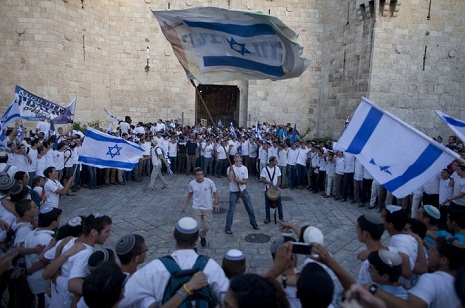“When you look at them, it makes them angry,” she explained.
The decades-old Jerusalem Day march has taken on a polarizing and nationalistic tone in recent years, with marchers attacking Palestinians in the cramped Arab quarter here and clashes erupting between Jewish and Palestinian youths, particularly near the Damascus Gate.
Yet there has been a broad-based effort this year to keep the parade from erupting into outright violence, as the city did last summer after the kidnapping and killing of three Israeli youths from a West Bank settlement, and the subsequent kidnapping and killing of a Palestinian teenager from East Jerusalem. Clashes took place during the march again this year, but no serious injuries were reported.
An Israeli rights group, Ir Amim, petitioned to change the route so it would not go through the Arab quarter, though the effort failed in court. And community groups organized separate events around the city to celebrate its diversity.
Israeli religious leaders, too, have condemned the violence and implored participants to refrain from provoking residents.
“I think there’s a legitimate joy and celebration of the return to the Old City of Jerusalem,” said Rabbi Aaron Leibowitz, 47, a city councilman. “What’s challenging for me is the nationalist and extremist layer that has been placed on top of that.”
He added: “We are clearly in the midst of a conflict, and there’s an Arab population of the city. The histories of two nations are not in harmony, and personally I believe we have to be sensitive to that.”
The 330,000 Palestinians of East Jerusalem form roughly one-third of its population, but they are more residents than citizens. They may apply for citizenship, but most do not because they believe it would legitimize Israel’s occupation of a city they seek as the capital of their own future state.
Poverty touches 75 percent of East Jerusalem’s Palestinians, and only 41 percent of children are enrolled in municipal schools, which have a shortage of 1,000 classrooms, according to a recent report by the Association for Civil Rights in Israel, which helps defend the rights of Palestinians in East Jerusalem.
Some 20,000 homes have been built illegally, because it is extremely difficult for Palestinians to obtain permission to build. In several high-profile cases, Israeli right-wing groups have seized Palestinian homes.
President Reuven Rivlin acknowledged these problems in his Jerusalem Day address.
“I fear that we ourselves have not yet looked frankly at the meaning of our sovereignty in the city,” he said. “We completed the physical unification of the city, but the task of unifying the city’s social and economic aspects have barely begun.”
For their part, Palestinians were blunt about how the Jerusalem Day march made them feel.
“All days are bad in Jerusalem, but this is the worst,” said Khaled Tuffaha, 45, a T-shirt salesman. “Would we Palestinians be able to march through a Jewish area like this? No,” he said. “They are there because they are showing the power they have over us.”
As he spoke, Mr. Tuffaha printed a shirt emblazoned with the word “Palestine.” Abu Gharbiyeh, 52, settled on a plastic chair in the alley and lit a shisha pipe. “How would you feel if somebody marched through your living room, without your permission?”
Like Umm Nidal, he gave only his nickname. Others gave only their first names, fearing they might draw the scrutiny of the Israeli authorities.
A Palestinian woman who declined to give her name said that she and her mother had to close their windows to stop the marchers from tossing stones and bottles into their home. “I can hear them insulting Arabs,” the woman said. “But I can’t see them.”
As evening fell on al-Wad Street, the extended Bakri clan huddled in the courtyard surrounded by their tiny, boxy homes.
Umm Nidal, a mother of six, firmly locked the door. “No, you can’t go outside,” she told the children.
Also forbidden: running to the balcony, because the adults feared that the police and marchers would think the children were going to hurl rocks at them.
Still, Ibrahim, 11, sneaked out to spy on the marchers. “I pretended I was Jewish and I saw them dancing!” he said excitedly.
The noise of the marchers thickened, along with the sound of stun grenades outside.
As dinner ended, the younger children raced to the balcony to see what was going on. “Come back!” the women shouted, to no avail.
Sighing, Umm Nidal, in a long head scarf and skirt, joined them. They were the only Palestinians leaning out to watch the marchers; nearby, soldiers stood on a roof.
Seeing the teenager’s rude gesture, the 3-year-old twins Razan and Raghad thought it was a friendly gesture and waved back. “Bye-bye!” they called.
More about:
















































